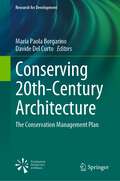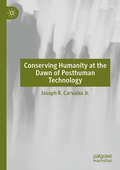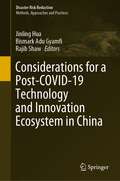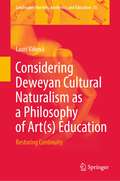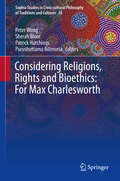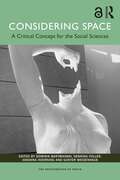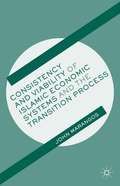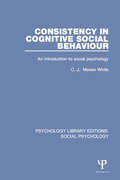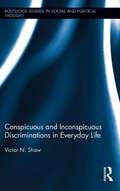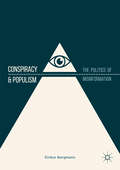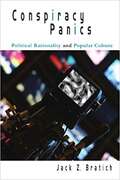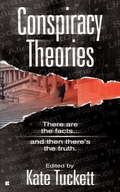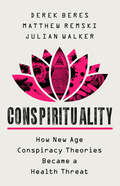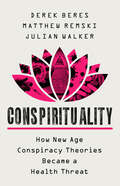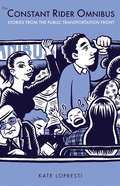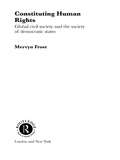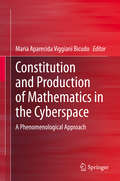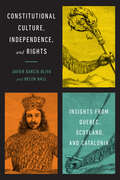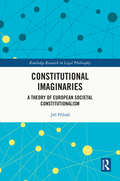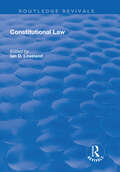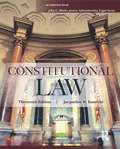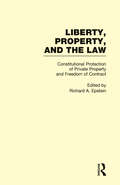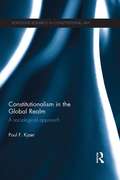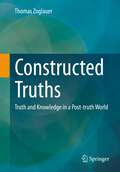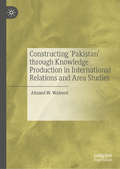- Table View
- List View
Conserving 20th-Century Architecture: The Conservation Management Plan (Research for Development)
by Maria Paola Borgarino Davide Del CurtoThis book offers an international overview of how to apply the Conservation Management Plan (CMP) to the 20th-century architectural heritage. Although the CMP is universally considered a fundamental tool for sustainable management of the built heritage, the application to 20th-century buildings is still limited. The book illustrates selected case studies from different countries to discuss how best to preserve the authenticity of the original materials, manage changes in use, engage users and stakeholders in this process, and make conservation and sustainability work together. "Conserving 20th-century architecture" will provide insights for scholars and students and assist architects in drafting an effective conservation management plan.
Conserving Humanity at the Dawn of Posthuman Technology
by Joseph R. Carvalko Jr.This volume examines the latest scientific and technological developments likely to shape our post-human future. Using a multidisciplinary approach, the author argues that we stand at the precipice of an evolutionary change caused by genetic engineering and anatomically embedded digital and informational technologies. The author delves into current scientific initiatives that will lead to the emergence of super smart individuals with unique creative capacities. He draws on technology, psychology and philosophy to consider humans-as-they-are relative to autonomy, creativity, and their place in a future shared with ‘post humans.’ The author discusses the current state of bioethics and technology law, both which policymakers, beset by a torrent of revolutionary advances in bioengineering, are attempting to steer. Significantly, Carvalko addresses why we must both preserve the narratives that brought us to this moment and continue to express our humanity through, music, art, and literature, to ensure that, as a uniquely creative species, we don’t simply vanish in the ether of an evolution brought about by our own technology.
Considerations for a Post-COVID-19 Technology and Innovation Ecosystem in China (Disaster Risk Reduction)
by Rajib Shaw Jinling Hua Bismark Adu GyamfiCOVID-19 has made differential impacts on countries and communities around the world. China, where COVID-19 started, has developed and utilized different types of technologies, including both traditional and disruptive technologies, to address the pandemic risks. Also, there have been many innovations in applying technologies in different contexts during the pandemic as well as in the post-pandemic recovery and preparedness aspects. This book covers some of these technological developments as well as the governance mechanisms for developing a technology and innovation ecosystem in a post-COVID-19 context in China. The book also explores the experiences and lessons learned from different types of technologies and their implementation in the post-COVID-19 period and highlights how they can be useful to prepare for future calamities.
Considering Deweyan Cultural Naturalism as a Philosophy of Art: Restoring Continuity (Landscapes: the Arts, Aesthetics, and Education #35)
by Lauri VäkeväThis book makes a case for cultural naturalism as a basis for a philosophy of art education. It argues for a holistic approach that avoids hard boundaries between artistic disciplines in the educational context, applying cultural naturalism to challenges that are topical for the whole art(s) education field, including challenges related to ecology, social justice, and technological transformation of culture. The book is written in the form of a conditional argument that considers the consequences of cultural naturalism for today’s philosophical problem-solving in art(s) education. It contains a systematic and historical analysis of cultural naturalism that support the philosophical reflection of educators and other scholars operative in this field. The result is a late modern reading of Deweyan cultural naturalism that highlights the continuance of key philosophical ideas from the modern to present discourses. The key topics discussed are of particular interest to present-day art(s) educators: ecological sustainability, social justice, and technological transformation of culture. In addition, this book provides an example of pragmatist argumentation, suggesting an alternative to analytical and post-philosophical approaches.
Considering Religions, Rights and Bioethics: Memorial Volume For Max Charlesworth (Sophia Studies in Cross-cultural Philosophy of Traditions and Cultures #30)
by Peter Wong Purushottama Bilimoria Sherah Bloor Patrick HutchingsThis volume engages in conversation with the thinking and work of Max Charlesworth as well as the many questions, tasks and challenges in academic and public life that he posed. It addresses philosophical, religious and cultural issues, ranging from bioethics to Australian Songlines, and from consultation in a liberal society to intentionality. The volume honours Max Charlesworth, a renowned and celebrated Australian public intellectual, who founded the journal Sophia, and trained a number of the present heirs to both Sophia and academic disciplines as they were further developed and enhanced in Australia: Indigenous Australian studies, philosophy of religion, the study of the tension between tradition and modernity, phenomenology and existentialism, hermeneutics, feminist philosophy, and philosophy of science that is responsive to environmental issues.
Considering Space: A Critical Concept for the Social Sciences (The Refiguration of Space)
by Dominik Bartmanski Henning Füller Johanna Hoerning Gunter WeidenhausConsidering Space demonstrates what has changed in the perception of space within the social sciences and how useful – indeed indispensable – this category is today. While the seemingly deterritorializing effects of digitalization might suggest that space is a secondary consideration, this book proves such a presumption wrong, with territories, borders, distances, proximity, geographical ecologies, land use, physical infrastructures – as well as concepts of space – all being shown still to matter, perhaps more than ever before. Seeking to show how society can and should be perceived as spatial, it will appeal to scholars of sociology, geography, architecture and urban studies.
Consistency and Viability of Islamic Economic Systems and the Transition Process
by John MarangosConsistency and Viability of Islamic Economics Systems and the Transition Process has the crucial intention of stimulating interest in Islamic economics by studying the Islamic Republic of Iran using the analytical framework of consistency and viability. This text develops an original analytic framework to understand the relationship between the economic, political, and ideological structures, the external environment, and the process of reform that gives rise to certain economic systems by establishing consistency. Consistency, however, is not enough; a consistent economic system must be flexible and have the internal mechanisms to be able to adapt to changes in social reality, thus making possible its survival over time. In other words, the economic system is viable when it is able to encourage increases in labor productivity and there is popular support. The collapse of centrally administered socialism in Central and Eastern Europe and the former Soviet Union resulted in what was commonly referred to as the transition problem.
Consistency in Cognitive Social Behaviour: An introduction to social psychology (Psychology Library Editions: Social Psychology)
by C.J. Mower WhiteSocial psychology remains unbalanced as long as we study human behaviour exclusively ‘from the outside’, leaving out of account people’s own reasons for acting as they do. Originally published in 1982, the result of the author’s emphasis on the cognitive dimension is a much more complete and well-rounded textbook of social psychology than had previously been available. Beginning with an exploration of the various models that have been suggested to explain the whole range of social behaviour, the book goes on to argue that consistency – comparability, similarity, congruity – is the principle by which social behaviour can best be explained. It goes into the cognitive processes that determine social attitudes, ascription of certain characteristics to individuals, and the attraction we feel to some people but not others. It also shows how these processes can be extended and affected by group membership. Consistency is important, the author believes, because it allows the maximum prediction of others’ behaviour and guidance of our own. These functions are demonstrated by observing failures of consistency, such as occur in humour and in negative self-esteem, and the author examines these inconsistencies in a final chapter.
Conspicuous and Inconspicuous Discriminations in Everyday Life (Routledge Studies in Social and Political Thought #80)
by Victor N. ShawIn everyday life, people negotiate on issues, entertain offers and counteroffers, and gain or lose in terms of economic capital, political power, communal status, and social influence. Although life goes on in the form of compromise, feelings of discrimination or misfortune haunt consciously or unconsciously in the minds of living individuals. History continues in the spirit of forgiveness, but residues of exploitation or injustice remain conspicuously or inconspicuously on the records of progressing civilizations. This study follows an average everyday life to compare individuals with individuals, individuals with organizations, and organizations with organizations in their everyday interactions. Through the eyes of the person, conspicuous and inconspicuous discriminations by one against another, whether individual or organizational, are identified in different occasions, on a typical day, at home, in the workplace, in the community, within the country, around the world, and throughout the course of life. In the style of Socrates, Plato, Wittgenstein, and other classical scholarship, this study uses ordinary, typical situations to demonstrate critical points, reveal subtle connections, and present important arguments. It offers vivid examples for what social scientists strive to find: the extraordinary from the ordinary, the unfamiliar from the familiar, the different from the similar, and the significant from the trivial. This study offers an opportunity for readers to reflect upon their social experiences, and rethink and reshape their everyday acts and actions.
Conspiracy & Populism: The Politics of Misinformation
by Eirikur BergmannEuropeans are being replaced by foreign invaders, aided by cultural Marxists who are plotting an Islamist subversion of the continent. The Bilderberg group – and/or the Illuminati – are instating a totalitarian New World Order. Angela Merkel is the secret daughter of Adolf Hitler, Barack Obama was illegitimate, and George W. Bush was in on the 9/11 attacks. Also, the Holocaust is a hoax, members of Pussy Riot are agents of the West, and the European Union is resurrecting the Roman Empire, this time as a communist super-state. These are some of the tales that are told by populist political actors across Europe, were raised during the Brexit debate in the UK, and have been promoted by presidents of both the US and Russia. Rapid rise of populist political parties around Europe and across the Atlantic in the early new millennium coincided with the simultaneous increased spread of conspiracy theories. This book entangles the two tropes and maps how right-wing populists apply conspiracy theories to advance their politics and support for their parties.
Conspiracy Panics: Political Rationality and Popular Culture
by Jack Z. BratichExamines contemporary anxiety over the phenomenon of conspiracy theories. <p><p> While most other works focus on conspiracy theories, this book examines conspiracy panics, or the anxiety over the phenomenon of conspiracy theories. Jack Z. Bratich argues that conspiracy theories are portals into the major social issues defining U.S. and global political culture. These issues include the rise of new technologies, the social function of journalism, U.S. race relations, citizenship and dissent, globalization, biowarfare and biomedicine, and the shifting positions within the Left. Using a Foucauldian governmentality analysis, Bratich maintains that conspiracy panics contribute to a broader political rationality, a (neo)liberal strategy of governing at a distance through the use of reason. He also explores the growing popularity of 9/11 conspiracy research in terms of what he calls the “sphere of legitimate dissensus.” Conspiracy Panics concludes that we are witnessing a new fusion of culture and rationality, one that is increasingly shared across the political spectrum. <p><p> Jack Z. Bratich is Assistant Professor of Journalism and Media Studies at Rutgers, the State University of New Jersey and the coeditor (with Jeremy Packer and Cameron McCarthy) of Foucault, Cultural Studies, and Governmentality, also published by SUNY Press.
Conspiracy Theories
by Jamie KingDid Michael Jackson fake his own death in a bid to escape financial ruin? Is swine flu a dastardly plot by global pharmaceutical companies or a scare campaign created by the pork industry's competitors? Are the British Royal Family really reptilian shape-shifting aliens? You'll discover startling evidence on these topics and many more in this compelling compendium of the world's scariest and wackiest conspiracy theories. This guide leaves no stone unturned as it delves into such conundrums as the mysterious circumstances of Alexander Litvinenko's death, the alleged withheld evidence pertaining to the 7 July bombings and whether global warming is a hoax. Whether you're a sceptic or a self-confessed conspiracy junkie, you'll find a cover-up for every occasion. And remember, just because you're paranoid doesn't mean they're not after you...
Conspirituality: How New Age Conspiracy Theories Became a Health Threat
by Julian Walker Derek Beres Matthew RemskiConspirituality takes a deep dive into the troubling phenomenon of influencers who have curdled New Age spirituality and wellness with the politics of paranoia—peddling vaccine misinformation, tales of child trafficking, and wild conspiracy theories. In the early days of the COVID-19 pandemic, a disturbing social media trend emerged: a large number of yoga instructors and alt-health influencers were posting stories about a secretive global cabal bent on controlling the world&’s population with a genocidal vaccine. Instagram feeds that had been serving up green smoothie recipes and Mary Oliver poems became firehoses of Fox News links, memes from 4chan, and prophecies of global transformation. Since May 2020, Derek Beres, Matthew Remski and Julian Walker have used their Conspirituality podcast to expose countless facets of the intersection of alt-health practitioners with far-right conspiracy trolls. Now this expansive and revelatory book unpacks the follies, frauds, cons and cults that dominate the New Age and wellness spheres and betray the trust of people who seek genuine relief in this uncertain age. With analytical rigor and irreverent humor, Conspirituality offers an antidote to our times, helping readers recognize wellness grifts, engage with loved ones who've fallen under the influence, and counter lies and distortions with insight and empathy.
Conspirituality: How New Age Conspiracy Theories Became a Public Health Threat
by Julian Walker Derek Beres Matthew RemskiConspirituality takes a deep dive into the troubling phenomenon of influencers who have curdled New Age spirituality and wellness with the politics of paranoia—peddling vaccine misinformation, tales of child trafficking, and wild conspiracy theories.In the early days of the COVID-19 pandemic, a disturbing social media trend emerged: a large number of yoga instructors and alt-health influencers were posting stories about a secretive global cabal bent on controlling the world&’s population with a genocidal vaccine. Instagram feeds that had been serving up green smoothie recipes and Mary Oliver poems became firehoses of Fox News links, memes from 4chan, and prophecies of global transformation.Since May 2020, Derek Beres, Matthew Remski and Julian Walker have used their Conspirituality podcast to expose countless facets of the intersection of alt-health practitioners with far-right conspiracy trolls. Now this expansive and revelatory book unpacks the follies, frauds, cons and cults that dominate the New Age and wellness spheres and betray the trust of people who seek genuine relief in this uncertain age. Each of the three authors has witnessed firsthand the use of fear-based political agendas to manipulate the human desire for spiritual fulfillment. They throw a spotlight on the telltale signs of cult dynamics and expose how influencers have stoked suspicion of public health initiatives. And they show how charlatans and pseudo-doctors encourage their followers to oppose mainstream advice as a form of spiritual quest. With analytical rigor and flashes of irreverent humor, Conspirituality offers an antidote to our times, helping readers recognize wellness grifts, engage with loved ones who've fallen under the influence, and counter lies and distortions with insight and empathy.
Constant Rider Omnibus: Stories From the Public Transportation Front (World Around Us Ser.)
by Kate LoprestiConstant Rider's Kate Lopresti describes her zine as, "Comedy, adventure, melodrama, the occasional horror," saying, "I never have writer's block when writing about the bus." Here, collected in book form, are Constant Rider issues 1-7, Kate's personal history as a patron of public transport. Kate stuffs everything she's got into these stories-anecdotes and accounts, from humor to hard times. Says Kate, "When I tell people about an adventure I had on the bus, they usually tell me a story of their own. People who don't ride the bus have nothing to say." Now in its second edition with 64 additional pages, Kate gives us observations, advice, reviews, reading lists, drunken passengers, celebrity sightings, overheard dialogue, and a whole lot of the funny. As writes Donny Smith in the review zine Xerography Debt, "This must be the most hilarious mass-transit zine there is!"
Constituting Human Rights: Global Civil Society and the Society of Democratic States (Routledge Advances in International Relations and Global Politics #17)
by Mervyn FrostGlobal civil society and the society of democratic states are the two most inclusive and powerful global practices of our time. In this book, Frost claims that, without an understanding of the role that individual human rights play in these practices, no adequate understanding of any major feature of contemporary world politics from 'globalisation' to 'new wars' is possible. Constituting Human Rights, therefore argues that a concern with human rights is essential to the study of International Relations.
Constitution and Production of Mathematics in the Cyberspace: A Phenomenological Approach
by Maria Aparecida Viggiani BicudoThis book brings together various studies that assume phenomenology to analyze how mathematics education is affected by the experience of being in the cyberspace. The authors of the chapters included in this contributed volume work with the theoretical framework developed by authors such as Edmund Husserl, Martin Heidegger and Maurice Merleau-Ponty to investigate how mathematics is produced and comprehended in a new way of being in the world, with digital technologies. The aim of this book is not to explain the tools used and how one works with them in the cyberspace, aiming at better teaching and learning mathematics. Its purpose is to present philosophical investigations that contribute to the understanding of the complexity of the world in which we are being researchers and mathematics teachers. By doing so, Constitution and Production of Mathematics in the Cyberspace – A Phenomenological Approach will help researchers and mathematics teachers understand their role in a world in which the experience of teaching and learning mathematics is being radically changed by new technologies and new ways of being in this world.
Constitutional Culture, Independence, and Rights: Insights from Quebec, Scotland, and Catalonia
by Helen Hall Javier Garcia OlivaIn Constitutional Culture, Independence, and Rights, Javier García Oliva and Helen Hall coin the term "constitutional culture" to encapsulate the collective rules and expectations that govern the collective life within a jurisdiction. Significantly, these shared norms have both legal and social elements, including matters as diverse as standards of parenting, the modus operandi of police officers, and taboos around sexuality. Using Quebec, Scotland, and Catalonia as case studies, the book delves into what these constitutional battles mean for the rights, identity, and needs of everyday people, and it powerfully demonstrates why the hypothetical future independence of these regions would have far-reaching practical consequences, beyond the realm of political structures and academic theory. The book does not present a magic bullet to resolve debates around independence – this is not its purpose, and the text in fact demonstrates why there is no objectively optimal approach in any or all contexts. Instead, it seeks to shed light on aspects of these situations often overlooked in discussions around the fate of nations, and it addresses what the consequences of constitutional paradigm shifts might be for individuals. Constitutional culture is a complex web of interconnected understandings and behaviours, and the vibrations from shaking or cutting a fundamental strand will be felt throughout the structure.
Constitutional Imaginaries: A Theory of European Societal Constitutionalism (Routledge Research in Legal Philosophy)
by Jiří PřibáňThis book offers a social theoretical analysis of imaginaries as constituent social forces of positive law and politics. Constitutional imaginaries invite constitutional and political theorists, philosophers and sociologists to rethink the concept of constitution as the normative legal limitation and control of political power. They show that political constitutions include societal forces impossible to contain by legal norms and political institutions. The constitution of society as one polity defined by the unity of topos-ethnos-nomos, that is the unity of territory, people and their laws, informed the rise of modern nations and nationalisms as much as constitutional democratic statehood and its liberal and republican regimes. However, the imaginary of polity as one nation living on a given territory under the constitutional rule of law is challenged by the process of European integration and its imaginaries informed by transnational legal and societal pluralism, administrative governance, economic performativity and democratically mobilised polity. This book discusses the sociology of imagined communities and the philosophy of modern social imaginaries in the context of transnational European constitutionalism and its recent theories, most notably the theory of societal constitutions. It offers a new approach to the legal constitutions as societal power formations evolving at national, European and global levels. The book will be of interest to scholars and students interested in constitutional and European law theory and philosophy as much as interdisciplinary and socio-legal studies of transnational law and society.
Constitutional Law (Routledge Revivals)
by Ian D. LovelandThis title was first published in 2000. This volume of essays explores a number of fundamental constitutional law questions in a variety of historical and jurisdictional contexts. The contributions focus on the role to be played by courts and legal principles in the resolution of major political controversies and on the progressive development of constitutional jurisprudence in countries sharing a broadly common law legal tradition. The guiding theme pervading the collection is an attempt to measure the legitimacy of judicial (in-)activism when courts are faced with difficult political choices on matters such as slavery, internment, racism and voting rights and radical economic policies and are also confronted with the requirement to attach concrete meanings to such abstract concepts as the separation of powers and the rule of law.
Constitutional Law (Thirteenth Edition)
by Jacqueline R. KanovitzPresents an up-to-date analysis of critical constitutional issues. Special attention is given to issues of greatest concern to criminal justice personnel _ detention, arrest, search and seizure, interrogations and confessions, self-incrimination, due process, and right to counsel. Also includes constitutional aspects of criminal and civil liabilities of justice personnel, and constitutional and civil rights in the workplace. Part II presents key cases to assist in interpreting the constitutional provisions.
Constitutional Protection of Private Property and Freedom of Contract: Liberty, Property, and the Law (Garland Studies in 19th Century American Literature #Vol. 5)
by Richard A. EpsteinFirst Published in 2000. Routledge is an imprint of Taylor & Francis, an informa company.
Constitutionalism in the Global Realm: A Sociological Approach (Routledge Research in Constitutional Law)
by Poul F. KjaerThis book develops a sociologically informed theory of constitutionalism in the global realm, addressing both national and transnational forms of constitutional ordering. The book begins with the argument that current approaches to constitutionalism remain tied to a state-based conception of constitutions, and overlooks underlying structural transformations that trigger the emergence of constitutional forms of ordering. Poul F. Kjaer aims to address this shortcoming by offering a sociological and historically informed analysis of the evolution of constitutionalism in the face of globalisation. The analysis contextualises on-going constitutional developments through the use of a long-term historical perspective, which is capable of highlighting the impact of deeper structural transformations unfolding within society. The book looks at the ways in which national and transnational legal forms have evolved alongside one another. It demonstrates that the formation of global constitutions has not resulted in a corresponding decrease in the power of nation states, but instead, legal and political aspects of both the nation state and the transnational have been reconfigured and intensified in a mutually supportive manner. In combining insights from a range of fields, this interdisciplinary book will be of great interest to students and scholars of constitutional law, sociology, global governance studies, and legal, social and political theory.
Constructed Truths: Truth and Knowledge in a Post-truth World
by Thomas ZoglauerIn a world in which more and more fake news is being spread, it is becoming increasingly difficult to distinguish truth from lies, knowledge from opinion. Disinformation campaigns are not only perceived as a political problem, but the fake news debate is also about fundamental philosophical questions: What is truth? How can we recognize it? Is there such a thing as objective facts or is everything socially constructed? This book explains how echo chambers and alternative worldviews emerge, it blames post-factual thinking for the current truth crisis, and it shows how we can escape the threat of truth relativism.
Constructing 'Pakistan' through Knowledge Production in International Relations and Area Studies
by Ahmed W. WaheedThis book analyses the discourse on Pakistan by exploring the knowledge production processes through which the International Relations community, Asian and South Asian area study centres, and think-tanks construct Pakistan’s identity. This book does not attempt to trace how Pakistan has been historically defined, explained, or understood by the International Relations interpretive communities or to supplant these understandings with the author’s version of what Pakistan is. Instead, this study focuses on investigating how the identity of Pakistan is fixed or stabilized via practices of the interpretive communities. In other words, this book attempts to address the following questions: How is the knowledge on Pakistan produced discursively? How is this knowledge represented in the writings on Pakistan? What are the conditions under which it is possible to make authoritative claims about Pakistan?
